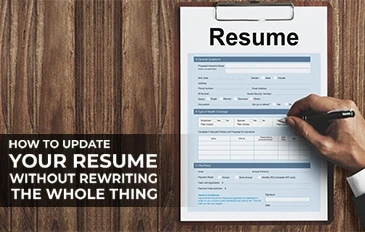
How to Update Your Resume Without Rewriting the Whole Thing
Job hunting has changed dramatically over the past few decades. The days of “pounding the pavement” looking for work door-to-door are long gone. Today, most applications are initially gathered and processed online. And while not every job posting requires one, your chances of landing a good position are always better with a quality resume. Nowadays, even entry-level positions in blue-collar fields like construction, paving, and environmental jobs will require that you send a resume. If yours has been figuratively gathering dust, here are some time-efficient tips to update it.
First Things First: the One-Page Rule
No matter how extensive education and experience, keep your resume to a single page. Some sources claim a two-page resume is okay, but we disagree. With potentially dozens of applications to review each day, the hiring manager is unlikely to look at anything beyond page one. Keep it concise, don’t waste their time —and if you catch their eye, they will be the ones asking for details.
Write an Attention-Grabbing Objective and Update it as You Apply for Positions
Now that you’ve cut down to the most essential information, you want to make sure it will be read. The first portion of your resume that’s meaningful to your audience is the objective. Here, you’ll describe what you’re looking for in a workplace, but also nail down the industry.
Write your objective near the top of the page —underneath your name and contact information— so it’s always easy to find and edit. The idea is to tailor your objective to each job application. While keeping the rest of your resume the same, you might send this for one application:
- Objective: To find full-time, entry-level construction work in the X area, and further grow my carpentry skills.
And this to another company:
- Objective: To use my years of experience in carpentry in a construction job in X location.
On the other hand, avoid objectives that are too broad and unspecific:
- Objective: I’ve developed some carpentry skills over the years and I’d really like to work in construction and learn more.
You can always tweak that objective line to reflect the business you’re applying to. Never apply to a position using a one-size-fits-all resume that doesn’t reflect the industry!
Now that you’ve told potential employers what you want from them, it’s time to show what you can offer them.
Capture an Interview with Great Work Experience
Now, don’t misunderstand us —we’re not saying you should make it up. So, you may ask, what if I don’t have great work experience? Well, it’s all in the way you present it. Not everyone can boast having worked on life-changing projects, but valuable work experience doesn’t have to be glamorous. Some of the least prestigious jobs can still demonstrate that you are hard-working and dependable. Highlight how they have equipped you with valuable transferable skills for the workplace. Most interviewers are looking for reliability first, while training and expertise come later. Use your resume to highlight your reliability, and any actions you were involved in that brought value to the company. For instance:
- Janitor at ABC Restaurant — ABC depended on me to arrive at work at 6:00 am every day for ten years, to make sure the restaurant was ready for business. I also helped research and select new cleaning products and more affordable cleansers over the years.
Don’t think this type of work experience is irrelevant if you are no longer looking for a cleaning position. By pitching your daily dedication and your valuable opinions to ABC management, you’ve made yourself look valuable to prospective employers too!
In summary, every resume is different. But the best ones are a single page, include an objective that’s tailored to the industry, and showcase your value as an employee. If you’re still unsure or need help creating an impactful resume, visit www.webuildresumes.com to learn more.
Michael DeSafey is a leading executive recruiter for professionals in the construction, engineering and environmental industries. He is currently the President of Webuild Staffing www.webuildstaffing.com . To learn more about Michael or to follow his blog please visit www.michaeldesafey.com
